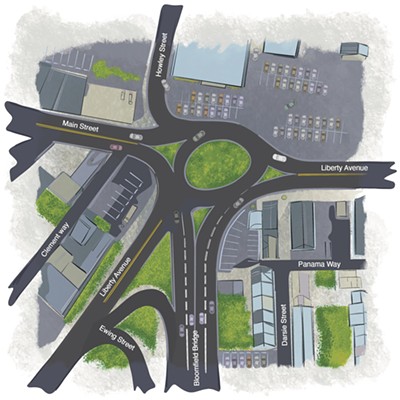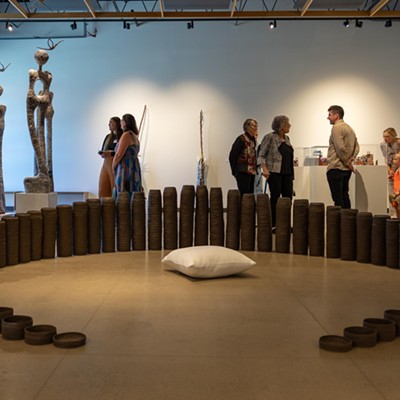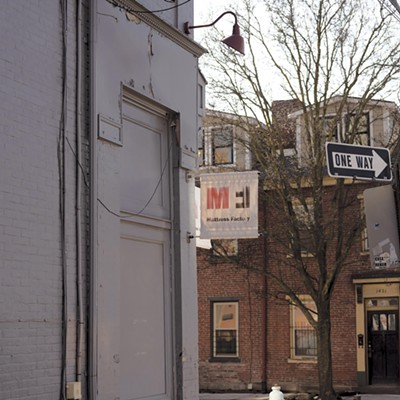Chatham University explores similarities between Rust Belt towns in China and America
[
{
"name": "Local Action Unit",
"component": "24929589",
"insertPoint": "3",
"requiredCountToDisplay": "1"
}
]
The plight of factory towns in China's industrial Northeast might seem completely unrelated to Pittsburgh and the surrounding Rust Belt region. But Dorothee Hou, a scholar of Chinese literature who has lived in both regions, says they share important commonalities.
To explore them further, Hou will visit Chatham University on Fri., Nov. 18 to speak with Allen Dieterich-Ward, an expert on Pittsburgh's industrial history based at Shippensburg University of Pennsylvania.
"There are definitely a lot of similarities," says Hou, who teaches at Moravian University in Bethlehem, Pa. "That's why I wanted to work on the literature that came from China's Rust Belt."
These similarities, says Hou, aren't just about shared economic and labor patterns but extend also to culture and identity. Like in Pittsburgh and other American Rust Belt communities, Chinese worker identity runs deep in the nation's industrial heartland.
Hou says for some workers, leaving decaying communities for booming coastal centers like Shanghai and Beijing carries the shame of family betrayal. And, as with blue-collar workers in middle America, Chinese urban elites also tend to look down on the parochial working class — particularly those from the Dongbei region in the Northeast.
"So, the stereotype is that they will all just stay in their car or their warm bed because it's too cold outside," Hou says. "They're lazy and also they're kind of stupid. They're not very business minded."
For his part, Dieterich-Ward says he will try to frame Pittsburgh's industrial narrative broadly and expansively to invite comparisons with Chinese working communities. He says it's important to unpack terms like "pre-industrial," "industrial," and "post-industrial" that can artificially suggest a single continuous narrative.
"Pittsburgh is still an incredibly industrial city," he says. "I mean, Homestead is now a shopping mall, but the [Edgar Thompson Steel Works] is still a functioning steel plant. We still have one of the largest coke ovens in the United States, right downstream."
China, which became a global manufacturing leader after Pittsburgh's steelmaking heyday, yet is home to hundreds of hollowed-out industrial towns, similarly shows the futility of simplistic narratives around industrial progress, says Dieterich-Ward.
"[China, Taiwan, and South Korea] are places that ... patterned themselves to an extent off of American industrial cities but are coming of age at a time of different technological possibilities," he says.
Karen Kingsbury, department chair of Chatham's humanities program, says she hopes the dialogue will help "connect the dots between the Chinese and American experiences of Rust and Revival — a topic of special relevance here in our region."
"For all of us who care about the future of our shared world, educating ourselves about the gaps and overlaps between Chinese and American experience, over the past century or so, ought to be a top priority," Kingsbury says. "We need that knowledge and understanding if we are to both prevent catastrophe and promote mutual well-being."
Rust and Revival in China and the U.S. 2-4 p.m. Fri., Nov. 18. Chatham University. Woodland Road, Shadyside. Free. Registration required. chatham.edu/events
To explore them further, Hou will visit Chatham University on Fri., Nov. 18 to speak with Allen Dieterich-Ward, an expert on Pittsburgh's industrial history based at Shippensburg University of Pennsylvania.
"There are definitely a lot of similarities," says Hou, who teaches at Moravian University in Bethlehem, Pa. "That's why I wanted to work on the literature that came from China's Rust Belt."
These similarities, says Hou, aren't just about shared economic and labor patterns but extend also to culture and identity. Like in Pittsburgh and other American Rust Belt communities, Chinese worker identity runs deep in the nation's industrial heartland.
Hou says for some workers, leaving decaying communities for booming coastal centers like Shanghai and Beijing carries the shame of family betrayal. And, as with blue-collar workers in middle America, Chinese urban elites also tend to look down on the parochial working class — particularly those from the Dongbei region in the Northeast.
"So, the stereotype is that they will all just stay in their car or their warm bed because it's too cold outside," Hou says. "They're lazy and also they're kind of stupid. They're not very business minded."
For his part, Dieterich-Ward says he will try to frame Pittsburgh's industrial narrative broadly and expansively to invite comparisons with Chinese working communities. He says it's important to unpack terms like "pre-industrial," "industrial," and "post-industrial" that can artificially suggest a single continuous narrative.
"Pittsburgh is still an incredibly industrial city," he says. "I mean, Homestead is now a shopping mall, but the [Edgar Thompson Steel Works] is still a functioning steel plant. We still have one of the largest coke ovens in the United States, right downstream."
China, which became a global manufacturing leader after Pittsburgh's steelmaking heyday, yet is home to hundreds of hollowed-out industrial towns, similarly shows the futility of simplistic narratives around industrial progress, says Dieterich-Ward.
"[China, Taiwan, and South Korea] are places that ... patterned themselves to an extent off of American industrial cities but are coming of age at a time of different technological possibilities," he says.
Karen Kingsbury, department chair of Chatham's humanities program, says she hopes the dialogue will help "connect the dots between the Chinese and American experiences of Rust and Revival — a topic of special relevance here in our region."
"For all of us who care about the future of our shared world, educating ourselves about the gaps and overlaps between Chinese and American experience, over the past century or so, ought to be a top priority," Kingsbury says. "We need that knowledge and understanding if we are to both prevent catastrophe and promote mutual well-being."
Rust and Revival in China and the U.S. 2-4 p.m. Fri., Nov. 18. Chatham University. Woodland Road, Shadyside. Free. Registration required. chatham.edu/events



















